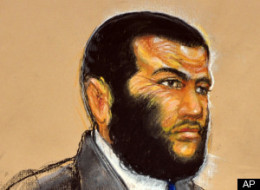Witnessing Guantanamo-Style Justice
Last week, the Obama Administration decided to try Khalid Shaikh Mohammed and four others accused Sept. 11 conspirators before a military commission at Guantanamo Bay, rather than a civilian court in the U.S. After Obama signed the declaration to close Guantanamo on this first day as President, he tried to bring these suspects to New York for a federal trial, but the public protested, Congress tied his hands, and he apparently didn’t have the political will to fight for it. As the Guantanamo military commissions ramp up once again, civil rights groups are sounding a chorus of protest.
Why should we listen? In fall 2009, I remember sitting in the courtroom on Guantanamo Bay, just a few miles away from the prisons, to observe a military commission hearing for Omar Khadr, a young man who had been imprisoned without charge at Guantanamo since he was 15. It looked and felt like a courtroom — the judge and lawyers were formal and exceedingly polite. The Obama administration requested a continuance for more time to decide where to try Khadr, and the judge granted it. The hearing was less than half an hour. All well and good. But during the hearing, a minor seemingly insignificant point was raised.
 Khadr’s lawyers complained that guards were reading the notes Khadr took during their meetings. This right to protect confidentiality of correspondence between defendants and their lawyers is rarely questioned in any federal courtroom. As a law student, I waited anxiously to hear the judge rule to protect this right. But at Guantanamo, the judge could not resolve the question. The commissions don’t give defendants the full span of rights granted in federal court. For this question, and many others, there’s no precedent that guarantees consistent rule of law. The courtroom began to swim, and the scene was exposed for what it was — without the legitimacy that comes from centuries of U.S. law, it felt like theater.
Khadr’s lawyers complained that guards were reading the notes Khadr took during their meetings. This right to protect confidentiality of correspondence between defendants and their lawyers is rarely questioned in any federal courtroom. As a law student, I waited anxiously to hear the judge rule to protect this right. But at Guantanamo, the judge could not resolve the question. The commissions don’t give defendants the full span of rights granted in federal court. For this question, and many others, there’s no precedent that guarantees consistent rule of law. The courtroom began to swim, and the scene was exposed for what it was — without the legitimacy that comes from centuries of U.S. law, it felt like theater.
When lives are at stake, we as a nation deserve more than than that. Keeping the commissions open increases the likelihood for future administrations to abuse them. And there’s nothing in the Military Commissions Act that restricts this parallel justice system to Guantanamo or just to unsavory alleged 9/11 conspirators. This is reason enough not just to listen to protests to the Mohammad trial but to join them.

